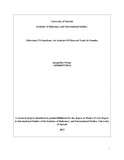| dc.contributor.author | Owigo, Jacqueline | |
| dc.date.accessioned | 2013-11-19T13:14:46Z | |
| dc.date.available | 2013-11-19T13:14:46Z | |
| dc.date.issued | 2013 | |
| dc.identifier.citation | A research project submitted in partial fulfillment for the degree of Master of Arts Degree in International Studies of the Institute of Diplomacy and International Studies, University of Nairobi | en |
| dc.identifier.uri | http://erepository.uonbi.ac.ke:8080/xmlui/handle/123456789/59493 | |
| dc.description.abstract | The study was about enforcing UN Sanctions; an Analysis of the ban in Charcoal trade in Somalia. Specific objectives were; to analyze charcoal trade in Somalia and establish if the UNSC ban on charcoal exports has been successful in attaining its objectives which was to deny Al-Shabaab cash flow from the charcoal exports, establish the key determinants in ensuring sanction efficacy and offer recommendations that will contribute to sanctions effectiveness in the case of Somalia. Statement of the problem; Sanctions are usually imposed on actors perceived to be breaking the norms. There has been a shift to the use of targeted or smart sanctions instead of the comprehensive sanctions which have been found be catastrophic on humans. Al-Shabaab has been an impediment to the peace process in Somalia and they have waged war and terror on the vulnerable Somalia people and impacting the international security. Charcoal trade is believed to be one the sources of funding for Al-Shabaab. Data collection method was through unstructured interview for primary data. Sampling population was 80 and sample size 30, chosen purposively by the researcher. Key findings include; political and economic costs to the target should be greater than the political and security costs of complying with sanctions demands. For a successful sanction effort, the cost of defiance borne by the target must be greater than its perceived cost of compliance. The sanctions imposed in Somalia has suffered challenges as a result of the defiance costs to the target being lower making them more defiant hence managing to adapt to the sanctions. The findings indicate that international support for sanctions is supposed to curb the target’s options for circumvention. Monitoring experts have also expressed their frustrations due to lack of cooperation between them and the sanction regimes or some member states. Leaders of non democratic regimes can withstand sanctions better compared to their democratic counterparts. Conclusion, sanctions need to be thought out prior to their use. Clear cut goals and objectives must be defined and communicated to the target country. Furthermore, a potential target country's economic and political situation must be analyzed to determine whether or not sanctions would be effective. Recommendation’ need for significant international cooperation, tree planting campaigns and negotiation with Al Shabaab, Tackle the issue of governance and capacity building. | en |
| dc.language.iso | en | en |
| dc.publisher | University of Nairobi | en |
| dc.title | Enforcing UN Sanctions: An Analysis of Charcoal Trade in Somalia | en |
| dc.type | Thesis | en |
| local.publisher | Institute of Diplomacy and International Studies | en |

